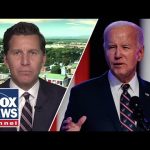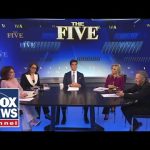In the whirlwind of recent political events, the past few days have showcased the chaotic nature of American governance, particularly as the presidency transitions between Joe Biden and Donald Trump. From Biden’s peculiar announcements to Trump’s decisive executive orders, the landscape of American politics feels like both a storm and a circus. This duality of change and continuity has left many observers questioning the integrity of our institutions and the seriousness of our leadership.
Joe Biden’s peculiar actions, such as his reference to a non-existent 28th amendment and his leniency towards the enforcement of the TikTok ban, raise eyebrows. Even more astonishing is how these events have been downplayed by mainstream media outlets. By failing to hold the president accountable for his whimsical declarations, reporters are complicit in a narrative that undermines the very framework of our Constitution. An amendment cannot be created or modified through presidential fiat, and treating it as such is not merely a lapse in judgment but a fundamental misstep that threatens the balance of power in our political system.
Trump’s administration has not been without its controversies, either. His pardons related to the events of January 6th have stirreda significant outcry. While some might argue he was merely adhering to promises made during his campaign, others view it as a reckless maneuver that could encourage dangerous behavior among his base. Furthermore, the inconsistency in how presidential powers are utilized poses an unsettling dilemma: where do we draw the line between necessary executive action and overreach? The emergence of these pivotal moments highlights a deep-rooted discord in how leaders interpret their roles and responsibilities.
The media response—or lack thereof—speaks volumes about the current landscape of American journalism. After four years of hyper-focus on the Trump administration, many outlets now seem overwhelmed by the sheer volume of news emanating from Washington. This shift has created an environment where critical issues are obfuscated, leaving the public without a clear understanding of the political ramifications of their leaders’ actions. Instead of fulfilling their role as watchdogs, reporters risk becoming mere spectators, cherry-picking which stories to amplify based on their ideological leanings.
Moreover, the broader implications of these political machinations cannot be ignored. The attempts by progressive groups to unionize and demand a reduced workweek exemplify a troubling trend in modern politics where individuals fail to grasp the weight of their responsibilities. The dissonance between the struggles typically faced by union workers and those in political or media positions could not be starker. In a time when the nation yearns for solid leadership and coherent policies, the fixation on personal comfort over accountability becomes a serious issue, one that threatens to derail substantive change.
Ultimately, if the past few days serve as any indication, the upcoming months will continue to challenge conventional political norms. Both Biden and Trump epitomize a broader struggle within American governance—an ongoing debate about the limits of executive power, the role of accountability in leadership, and the responsibilities of the media. As citizens navigate this turbulent political terrain, they must remain vigilant, demanding transparency and integrity from those in positions of power, lest they succumb to the whims of leadership unbound by principle or consequence. This is not merely an issue of partisan politics; it is about preserving the very foundations of our democracy.




